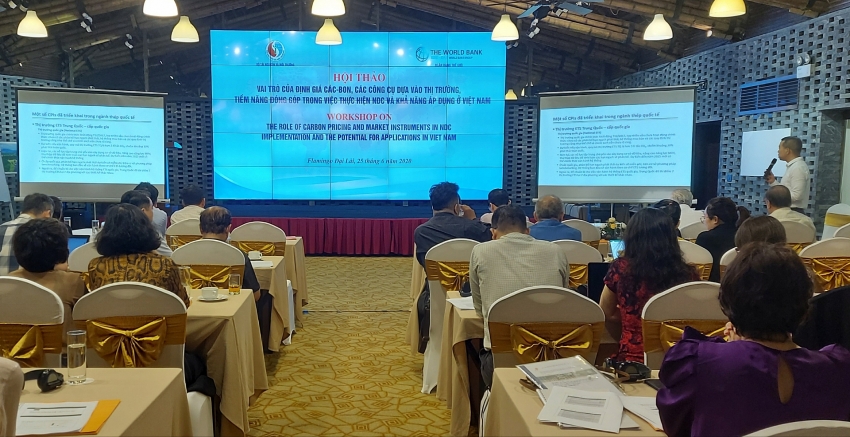Carbon pricing instrument should be driven by national conditions
 |
| Vietnam is working on building a carbon trading mechanism to promote sustainable, green growth |
Participating in the workshop “The role of carbon pricing, market instruments in Nationally Determined Contributions implementation and the potential for application in Vietnam” taking in Vinh Phuc province yesterday, a representative of the Natural Resources and Environment Planning and Educating Department under the Ministry of Planning and Investment affirmed that the private sector has a potential role in Vietnam's carbon market.
According to the representative, the private sector has the highest contribution to economic growth, accounting for about 40 per cent of GDP, attracting over 80 per cent of the national labour force. During 2010-2015, private investment into energy efficiency projects and solutions was from $100-230 million per industry, in which the four industries of steel, cement, paper, and sugar cane invested $627.8 million. However, he also affirmed that the private sector has a limited budget while the financial regime is still strict and sometimes difficult for this sector. Therefore, carbon pricing requires a transparent legal framework which encourages private investment. Besides, public financial lever for private investment should be strengthened.
Meanwhile, Le Thu, an environmental expert from the World Bank told VIR that although Vietnam has been striving to reduce greenhouse gas emissions, the government still needs to release additional policies on promoting clean electricity and help enterprises strengthen their technology to reduce emissions and understand what the government is doing. “The carbon market has great impacts on the economy, it is a chance at competition for enterprises. But in the first stage, we should let enterprises get ready by changing technology or input materials,” Thu said.
Wondering about the carbon emission levels applied for different kinds of energy like electricity, gas, Nguyen Thi Huyen, deputy head of Environmental and Sustainable Development Department, Insitute of Energy, Ministry of Industry and Trade said that currently, Vietnam has no specific sanctions, price, and carbon market so there is no basis for emissions trading.
“We, the energy sector, can use the market price of the clean development mechanism (CDM) but it is very cheap, nearly zero, and neither do we have the right to use tax for this emission,” Huyen said. “Moreover, the energy industry is importing a large amount of coal and using types of mixed coal at different rates with different emission coefficients so it would be very important to set clear indicators for each type and each sector. This would also make the work of implementers a lot more convenient.”
At the workshop, delegates agreed that to develop a carbon market, the government should use market mechanism for emission facillities to follow by either changing operations, reducing emissions, or paying to offset their emissions. Delegates also agreed that carbon pricing can be implemented by many different instruments but must be suitable with the conditions of each country, ensuring sustainable development of the country, enterprises, and community.
What the stars mean:
★ Poor ★ ★ Promising ★★★ Good ★★★★ Very good ★★★★★ Exceptional
Related Contents
Latest News
More News
- Trung Nam-Sideros River consortium wins bid for LNG venture (January 30, 2026 | 11:16)
- Vietnam moves towards market-based fuel management with E10 rollout (January 30, 2026 | 11:10)
- Envision Energy, REE Group partner on 128MW wind projects (January 30, 2026 | 10:58)
- Vingroup consults on carbon credits for electric vehicle charging network (January 28, 2026 | 11:04)
- Bac Ai Pumped Storage Hydropower Plant to enter peak construction phase (January 27, 2026 | 08:00)
- ASEAN could scale up sustainable aviation fuel by 2050 (January 24, 2026 | 10:19)
- 64,000 hectares of sea allocated for offshore wind surveys (January 22, 2026 | 20:23)
- EVN secures financing for Quang Trach II LNG power plant (January 17, 2026 | 15:55)
- PC1 teams up with DENZAI on regional wind projects (January 16, 2026 | 21:18)
- Innovation and ESG practices drive green transition in the digital era (January 16, 2026 | 16:51)

 Tag:
Tag:




















 Mobile Version
Mobile Version